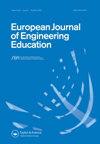The development of engineering education research: a UK based case study
IF 2.8
Q2 EDUCATION & EDUCATIONAL RESEARCH
引用次数: 0
Abstract
ABSTRACT This work adopts a case study approach to examine the emergence of engineering education research (EER) within the UK. First, a summary of the contextual factors influencing UK EER activity are presented. This section includes information pertaining to higher education (HE) policy, networks, and funding. Semi structured interviews are used to investigate who identifies as an engineering education researcher; how they define engineering education as a field of research; who they consider their audience to be; and the factors that inform their research questions, methodologies, collaborators and where they disseminate their work. The findings are discussed in relation to the social, political, and economic systems in which engineering education exists. The study reveals a landscape in which EER research is largely unfunded, and is primarily conducted by intrinsically motivated academics who concentrate on topics of personal interest or local context, and who do not usually collaborate or publish within journals.工程教育研究的发展:基于英国的案例研究
本文采用案例研究的方法来考察英国工程教育研究(EER)的兴起。首先,总结了影响英国工程教育活动的背景因素。本节包括与高等教育(HE)政策、网络和资金有关的信息。半结构化访谈用于调查谁是工程教育研究人员;他们如何将工程教育定义为一个研究领域;他们认为自己的听众是谁;以及为他们的研究问题、方法、合作者以及在哪里传播他们的工作提供信息的因素。这些发现与工程教育所处的社会、政治和经济系统有关。这项研究揭示了一种情况,在这种情况下,EER研究基本上没有资金,主要由有内在动机的学者进行,他们专注于个人兴趣或当地背景的主题,通常不在期刊上合作或发表文章。
本文章由计算机程序翻译,如有差异,请以英文原文为准。
求助全文
约1分钟内获得全文
求助全文
来源期刊

European Journal of Engineering Education
EDUCATION & EDUCATIONAL RESEARCH-
CiteScore
7.30
自引率
13.00%
发文量
64
期刊介绍:
European Journal of Engineering Education is published six times a year in print and electronic editions and provides an essential forum for dialogue between researchers and specialists in the field of engineering education, at European and worldwide levels. European Journal of Engineering Education is the Official Journal of SEFI, the Socièté Européenne pour la Formation des Ingénieurs (the European Society for Engineering Education). SEFI is a non-governmental organization whose aims are to develop information about engineering education, to improve communication and exchange between professors, researchers and students and to promote cooperation between the various institutions concerned with engineering education.
 求助内容:
求助内容: 应助结果提醒方式:
应助结果提醒方式:


